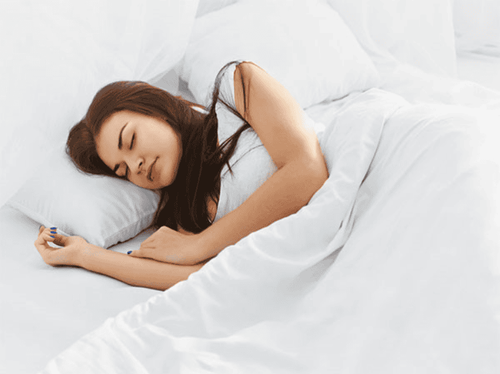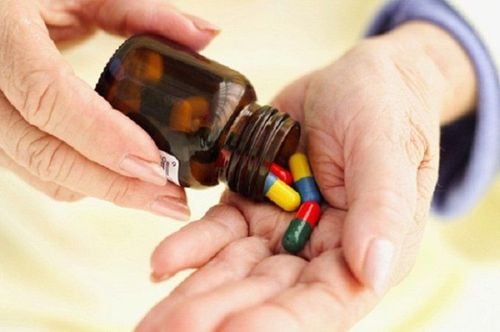This is an automatically translated article.
A good night's sleep not only makes you feel better, more energetic, but it is also associated with better health and is a prerequisite for living a longer life.
1. Why sleep better live longer?
In modern life there are many things that make us preoccupied and sleep later every night for example a favorite program, facebook or there are people who need to work more. This seriously affects sleep, health and indirectly reduces life expectancy.
Many studies have shown that good sleep lives longer. A study of nearly 16,000 Chinese adults aged 65 and over found that those who regularly got a good night's sleep also had better overall health and life expectancy, in relation to living longer. longer. People who sleep less often experience at least one chronic medical condition or often have to struggle with daily tasks tirelessly.
When we don't get enough sleep or don't sleep well, it can increase the risk of the following health problems:
Cause fatigue or be easily affected by external influences on mood. This increases the risk of depression in people who don't sleep better. A weakened immune system increases the likelihood of infections. Aggravation of common infectious diseases, especially this condition is more dangerous in the elderly. Poor sleep increases the risk of cardiovascular disease, diabetes, obesity. Too little sleep also puts you at risk of fatal accidents. A 2014 study found that sleeping six hours a night increased the risk of being in a car accident by 33% compared to sleeping seven or eight hours a night. The researchers concluded that 9% of motor vehicle crashes could be attributed to people sleeping less than 7 hours per night. In addition, it is worth noting that the fact that we sleep for more than 9 hours a night also increases the risk of chronic disease, obesity, stroke. Thus, a good night's sleep is a prerequisite for good health and a longer life. Good sleep, deep sleep and enough sleep helps our body to be healthier, more energy to work and live every day.

Ngủ ngon sống trọn khiến cho tâm trạng của bạn tốt hơn
2. How much sleep do you need?
Enough sleep is very important, but we do not necessarily know how to sleep enough. Each age group has a different amount of sleep.
Newborns (0-3 months old) need 14-17 hours of sleep per day. Babies spend most of their time sleeping, and sleep is very important at this stage. Newborns (4-11 months old) need 12-15 hours a day. At this time, children often practice sleeping together mainly at night. Toddlers (1-2 years old) need about 11-14 hours a day. Preschool children (3-5 years old) need 10-13 hours a day. School-age children (6-13 years old) need 9-11 hours a day. Teenagers (14-17 years old) need about 8-10 hours a day. Most adults need 7 to 9 hours. Older adults (65 years of age and older) need 7-8 hours of sleep per day. Adults need to sleep a total of 7 to 9 hours a day is enough, sleeping time should be concentrated in the evening rather than in the morning. Some studies have found that sleeping less than 7 hours or more than 9 hours a day or having daytime sleep greater than 90 minutes are associated with an increased risk of disease. Specifically, it increases the risk of cardiovascular disease, stroke, cancer risk and mental disorders such as depression.

Thư giãn trước khi đi ngủ, học cách tránh lo lắng và suy nghĩ trước khi đi ngủ để ngủ ngon
3. How to sleep better every night?
Insomnia is a very common problem and sometimes difficult to control. However, you may benefit from a daily sleep hygiene routine that increases the amount of time you sleep each night. Some sleep hygiene measures you can adopt to sleep better include:
Establish a constant sleep schedule with the same bedtime even on weekends or holidays. Limit the use of alcoholic beverages such as wine, beer and caffeine, especially before going to bed. Avoid using blue light devices such as phones, computers, or other devices for an hour or more before bedtime. Relax before bed, learn to avoid worries and thoughts before bed. Create a bedroom that is warm and safe, with minimal light and noise. You should exercise for about 30 minutes a day, at least 5 days a week and note that you should exercise at least 5 hours before going to bed. Avoid exercising before bed, as the increase in body temperature will make it difficult to sleep. If you find yourself having trouble falling asleep, don't try to sleep in bed, but get up and do something quiet, such as reading or journaling until you feel drowsy. Set a goal of no more than 30 minutes of napping or no extra naps in the afternoon so you don't clutter up your nightly sleep schedule. Exposure to sunlight is recommended to increase the correlation between the biological clock and sunlight. A good night's sleep is proven by many studies, so to live well today, you need to learn how to sleep better every day. If you have health problems, you should see a doctor for proper advice and treatment.
Please dial HOTLINE for more information or register for an appointment HERE. Download MyVinmec app to make appointments faster and to manage your bookings easily.
References: webmd.com, verywellhealth.com













